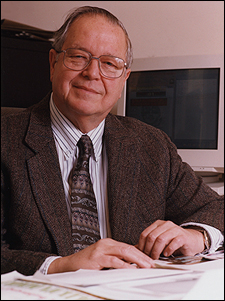June 13, 2012
Dean Kenneth F. Galloway has announced that a Patrick and Charlotte Fischer Computer Science Scholarship will be awarded at the beginning of the 2012 fall semester.
The scholarship has been established with gifts from both Patrick and Charlotte Fischer to provide need-based support for undergraduate study in computer science at Vanderbilt.
 Prof. Fischer at Vanderbilt in 1997 |
Professor Patrick Fischer, who helped build the Department of Computer Science at Vanderbilt University, died Aug. 26, 2011 in Montgomery County, Md, where Professor Charlotte Fischer resides. He was 75.
An expert in informational systems for education institutions, computational complexity and interactive database systems, Patrick Fischer taught 18 years at Vanderbilt’s School of Engineering beginning in 1980 and served as chair of the computer science department for 15 of those years.
“Patrick was a leader in the computer science community for his work on database theory,” said Larry Dowdy, professor of computer science and computer engineering. “At Vanderbilt, he played a key role in the computer science program during its infancy. He worked passionately to build a first-rate program, one balanced between excellence in research and excellence in the classroom.”
Fischer deftly adjusted teaching methods in the department to dramatic industry and educational innovations during his tenure.
“Traditional classroom methods don’t work as well anymore,” he told the Vanderbilt Register in 1995. “Students are used to multimedia, so blackboard lectures have become boring.”
Fischer was an early leader in the field of computational complexity, and helped establish theoretical computer science as a discipline separate from mathematics and electrical engineering. He was the first chair of SIGACT, the Special Interest Group on Algorithms and Computation Theory of the Association for Computing Machinery, which he founded in 1968. He also founded the annual Symposium on Theory of Computing, which together with the Symposium on Foundations of Computer Science is one of the two flagship conferences in theoretical computer science, and he served five times as chair of the conference.
In the 1980s, Fischer’s research interests shifted to database theory. His research in that area included the study of the semantics of databases, metadata, and incomplete information.
Fischer’s study of the mathematics of query languages — the mechanics of database searches — was crucial in the development of systems now commonly employed by Google, Amazon and every other website with a search box.
But while the commercial application of his work helped give birth to a generation of billionaires, Fischer never regretted remaining a scholar and teacher. “He was an academic,” said Dirk Van Gucht, a professor of computer science at Indiana University and former student of Professor Fischer. “And he was a wonderful teacher.”
Born in St. Louis, Fischer grew up in Ann Arbor, Mich., and graduated from the University of Michigan in 1957. He earned his Ph.D. in mathematics from the Massachusetts Institute of Technology. He held faculty positions at Harvard, Cornell, Waterloo and Pennsylvania State University before his arrival at Vanderbilt.
 Prof. Charlotte Fischer |
Charlotte Froese Fischer is professor of computer science, emerita. Charlotte Fischer joined the engineering faculty in 1980 when the Fischers arrived at Vanderbilt. She was the first woman tenured in the School of Engineering (1980).
Fischer is internationally known for her software for atomic structure calculations and her research in atomic structure theory. In 1991 she became a Fellow of the American Physical Society, in part for her contribution to the discovery of negative calcium. In 1995 she was elected a member of the Royal Physiographical Society of Lund and in 2004, as a foreign member of the Lithuanian Academy of Sciences.
Charlotte Fischer began her teaching and research career in Canada, first at the University of British Columbia, 1957–1968, and then at the University of Waterloo, 1968–1975. At both universities, Fischer was instrumental in building computing science courses into the curriculum. Fischer has been a university professor at Penn State University and then Vanderbilt University, 1980-1998. She also has served as a guest researcher at the National Institute of Standards and Technology.
Fischer has produced a large body of published work. She has written more than 250 scientific papers, including an early paper on her now-famous MCHF (Multi-Configuration Hartree-Fock) computer program that has been named a “Citation Classic” because it is cited so frequently by other researchers. She has written a book about computational atomic structure and a biography of her Ph.D. supervisor and mentor, British mathematician Douglas R. Hartree.
Fischer was born in Nikolayevka, Ukraine. Her parents immigrated to Germany in 1929 on the last train allowed to cross the border before its closure by Soviet authorities. After a few months in a refugee camp, her family was allowed to immigrate to Canada, where they eventually established themselves in Chilliwack, British Columbia. She obtained both a B.A. degree, with honors in Mathematics and Chemistry, and an M.A. degree in Applied Mathematics from the University of British Columbia in 1952 and 1954, respectively.
She then obtained her Ph.D. in applied mathematics and computing at Cambridge University in 1957. Fischer spent 1963-1964 at the Harvard College Observatory, where she extended her research on atomic structure calculations. While at Harvard, she was the first woman scientist to be awarded an Alfred P. Sloan Fellowship.
Electrical Engineering and Computer Science,VUSE Latest News,Alumni